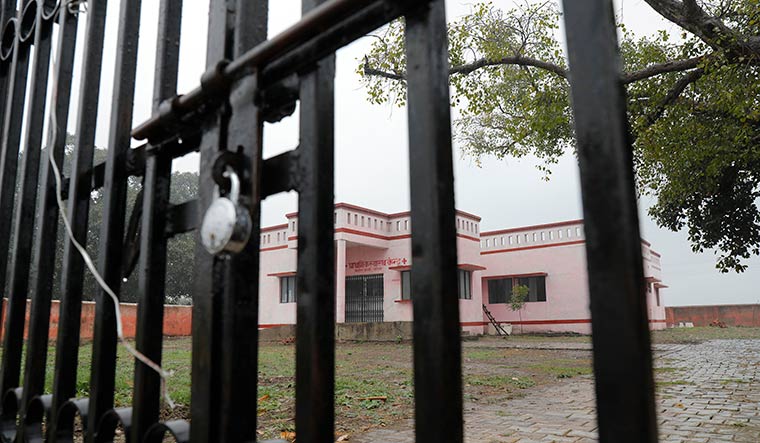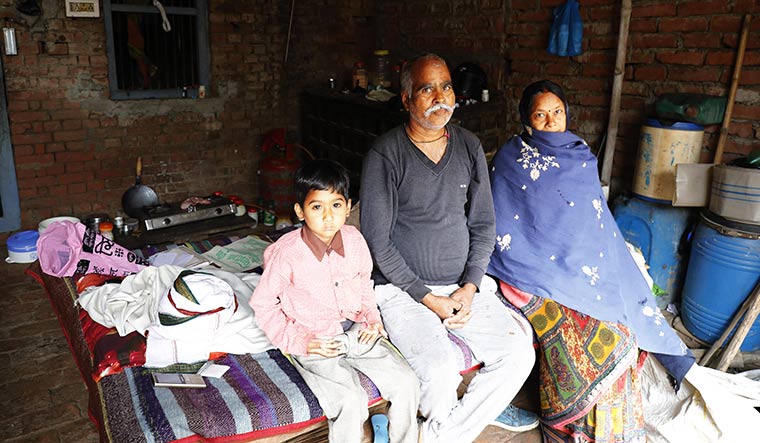There was a little girl who dreamt of flying to faraway lands and taking her parents along once she grew up. “In her own way, she fulfilled that promise. They took her to Singapore to be treated and came back with her dead body,” says Suresh Kumar Singh, 52, uncle of the 23-year old physiotherapy intern who was gang-raped on the night of December 16, 2012, in Delhi.
Suresh is the youngest of four brothers; the intern’s father, Badrinath, is the third one. Suresh is the only one who stayed back in the family’s ancestral village of Merwara Kala in Uttar Pradesh’s Ballia district that borders Bihar, and tends to the five acres that the brothers share. Suresh says Badrinath was adamant that his three children would study as much as they wanted. “He worked overtime in his job as a loader,” he says. So careful was the intern’s family with money that in the aftermath of the gang-rape, though desperate for the comfort, they did not ask their relatives from the village to come to Delhi. Suresh says he went nevertheless, armed with a sack of rice and dal so that his brother’s family would not be burdened.
In the immediate aftermath of the gang-rape, a nation’s collective conscience was so shaken by the brutality of the act that it revisited its laws on rape and juvenile justice. International media descended on the village. “At 4am, when we would rise to perform tilanjali (an offering of sesame seeds in water) to a peepal (sacred fig) tree near our home, an Australian television crew would come to film us,” says Suresh. “They did so every day till the 13th day. Politicians of all hues came to the village.”
Akhilesh Yadav, then chief minister, flew in, landing on a helipad built on a ground neighbouring the village’s secondary school. Overnight, the road to the village from the Ghazipur-Hajipur highway was fixed with a mix of cement and soil. Yadav announced that a hospital would be built and named after Nirbhaya. An intermediate college was also promised, as were jobs to four members of the family. None of those promises were fulfilled.
Not much remains of the helipad today. The road is bits of smooth earth between innumerable potholes and takes 30 minutes to cover. At the end of it is a plaque stating that a cement-concrete road was constructed in the fiscal year 2018-19 and dedicated to the public by MLA Upendra Tiwari, now minister of state for sports, youth welfare and panchayati raj. Next to the plaque stands a primary health centre (PHC)—the version of the hospital that was promised. It is an expansive pink structure. But villagers say it is incomplete. There are no drains. There is no provision for the water tank to be filled. On the day we arrive, its gate is locked. “This is usual,” say villagers.
The PHC has no doctor, only two pharmacists. “They are most unhelpful,” says Arya Pandey, 22, who is doing her master’s in English literature in Ballia. She says that she had gone there when her friend cut her palm with a blade. When she asked the pharmacists for medicine, they pointed to a box and told her to pick up whatever she wanted from there. “I asked if they could at least bandage the wound. They said it wasn’t their job to do so,” says Pandey.
Pandey also volunteers for the Red Brigade Trust that trains girls in self-defence skills. On February 9, she and a couple of other volunteers staged a sit-in by the PHC’s locked gate, demanding that a doctor be appointed. About six volunteers stayed the night at the spot. They called up the superintendent of police for protection, but to no avail. Only a constable from the nearest police station came to check if the protesters were up to anything illegal. Two days went by and the number of protesters swelled to 50.
On February 11, Chief Medical Officer (CMO) Pritam Kumar Mishra came to the protest. He asked if any youth from the village had it in them to study for 17 years to become a doctor. “Pehle doctor paida karo, phir doctor maango (First produce a doctor, then ask for a doctor),” he mocked them. Someone said, “We had sent a daughter of our village to study, look what happened to her.” The CMO retorted, “Which daughter?” The villagers replied, “Have you heard of Nirbhaya?” He snapped back, “Why did she go to Delhi?”
Admitting that the exchange was wrong, district magistrate Srihari Pratap Shahi tells THE WEEK that a doctor has been attached to the centre. He had also written to the principal secretary (health) to name the PHC after Nirbhaya, but the said officer was transferred two days later, he says.
Shahi admits that the Ballia of today is not much different from what it was eight years ago. Job opportunities remain scarce and the push factors for migration are high. “This is an agriculture-based district. There are no industries,” says Shahi. “I have been in talks with farmers to set up some agro-based units.”
Even under the state’s much-touted ‘One District, One Product’ scheme that seeks to give a boost to the flagship product of a district through investment, marketing and export, Ballia has had an unexciting deal as its product is bindi. But Shahi says that it is a low investment product and could yield high profitability. “If we can look at mechanising its production and packaging, it could do well,” he says.
There is nothing in Ballia to show that it is the home of former prime minister Chandra Shekhar. Except for rail connectivity, it seems untouched by India’s development story. Given the slightest opportunity, its young would like to leave. At the Shri Murli Manohar Town Post Graduate College, Pooja Singh, 23, who is pursuing a BEd course, shares another reason for this sentiment. “I was very young when it [the gang-rape] happened. But it still makes my hair stand on end,” she says. “I did my graduation from Allahabad. There is such a vast difference in the way boys and girls interact there. I had to walk for an examination the other day. The whole time I was scared of what could happen to me. In Ballia, girls will never know what it is like to live without fear.”
Ballia’s MP Virendra Singh was addressing a function at the college the same day. When asked about the unfulfilled promises to Merwara Kala, he says, “What Merwara Kala? I have limited interest in that matter. My knowledge about it is also limited; hence I will not talk about it.”
Lalji Singh, 69, the younger brother of Nirbhaya’s grandfather, says even if half of what the village was promised was delivered, it would be shining today. “But time has stood still,” says the retired teacher.
And, with the hanging of the convicts, Merwara Kala will be forgotten—its hopes for a better future snuffed out, like the life of its most well-known daughter was.



